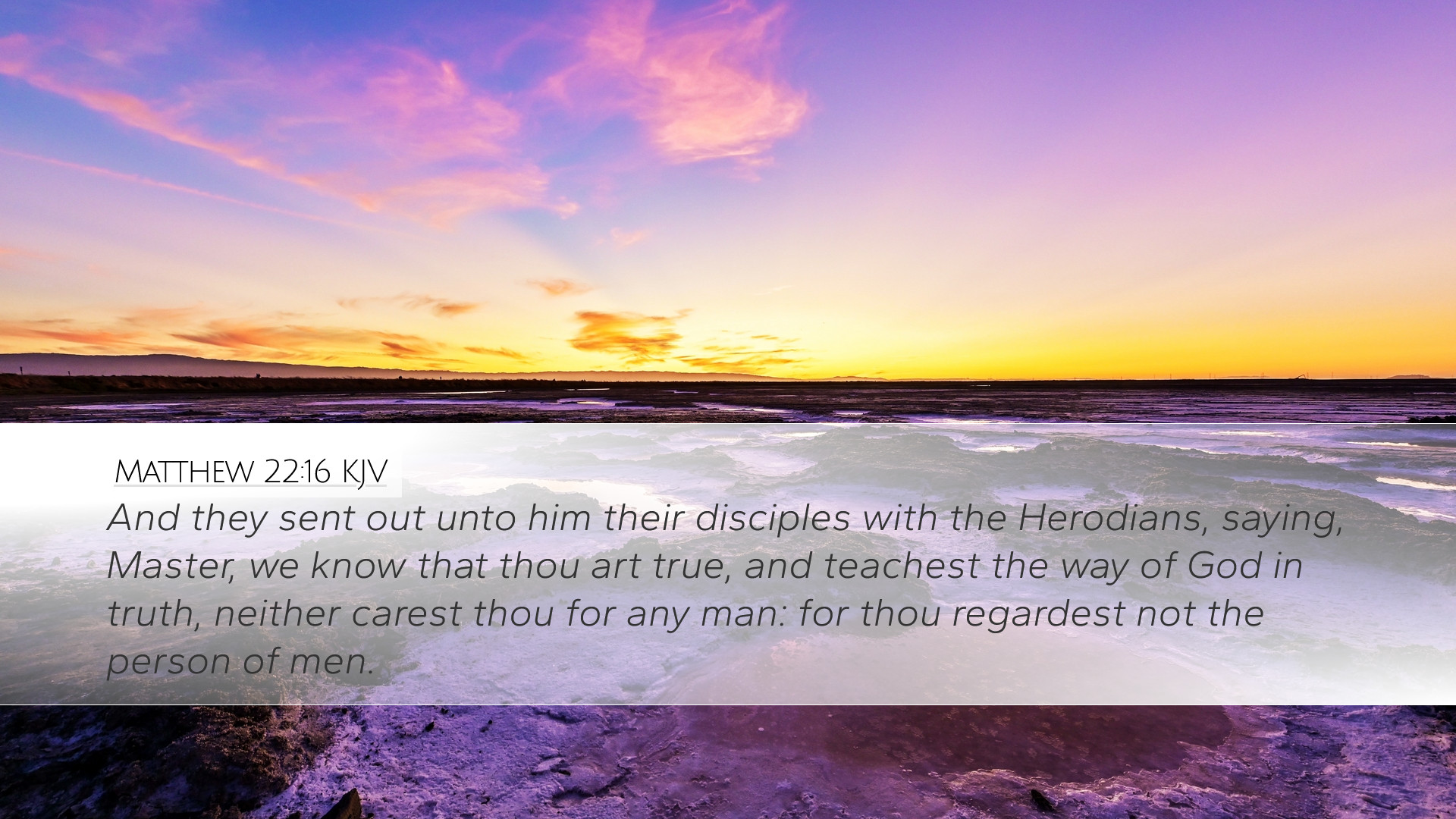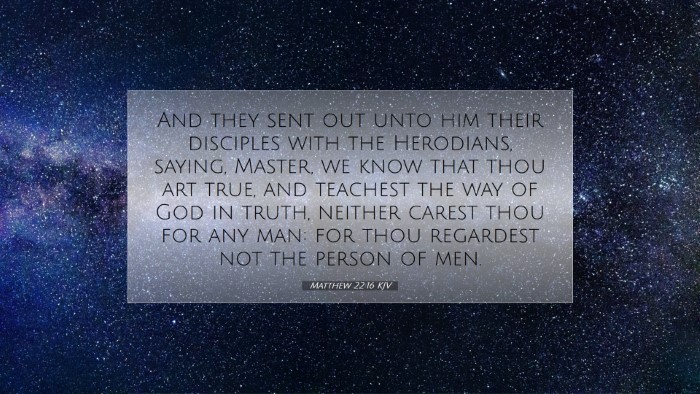Commentary on Matthew 22:16
Verse (Matthew 22:16): "And they sent their disciples to him, along with the Herodians, saying, 'Teacher, we know that you are true and teach the way of God truthfully, and you do not care about anyone's opinion, for you are not swayed by appearances.'
Contextual Overview
This passage is situated in the heart of the Gospel of Matthew, portraying a critical moment in the ministry of Jesus. After days of questioning and challenges from the Jewish authorities (including Pharisees and Sadducees), this interaction highlights the persistent tension between Jesus and these groups. The verse reflects an attempt by the Jewish leaders to entrap Jesus in a political controversy, a tactic analyzed by various biblical scholars.
Insights from Matthew Henry's Commentary
Matthew Henry draws attention to the collaboration between the Pharisees and Herodians, two groups that typically opposed one another. This alliance emphasizes the desperation of the Jewish leaders to undermine Jesus' authority. Henry notes the psychological manipulation in their approach, as they flatter Jesus by acknowledging his truthfulness and moral integrity, which contrasts sharply with their ulterior motives.
- Flattery and Deceptive Intent: Henry argues that their greeting is a setup, intentionally designed to provoke Jesus into making a controversial statement that could be used against him.
- Recognition of Authority: The term "teacher" highlights their acknowledgment of Jesus’ role yet carries irony through their subsequent questioning.
Insights from Albert Barnes' Commentary
Albert Barnes provides a detailed exploration of the phrase “you do not care about anyone's opinion.” He interprets this as a recognition of Jesus' fearless proclamation of truth, regardless of societal pressures. Barnes highlights that this aspect of Jesus was a defining feature of his mission and character.
- Fearless Proclamation: Jesus' ability to stand firm against both popular opinion and religious authority exemplifies his commitment to divine truth.
- Challenge of Authority: Barnes also points out that this verse sets the stage for the controversial question about paying taxes to Caesar, thereby revealing Jesus' wisdom in navigating complex social and political waters.
Insights from Adam Clarke's Commentary
Adam Clarke emphasizes the historical context and the implications of this confrontation. Clarke explains the roles of the Herodians as supporters of the Roman rule, contrasting their interests with the Pharisaic beliefs that sought to maintain Jewish independence.
- Sociopolitical Dynamics: Clarke explains that the cooperation between these factions signifies the profound threat that Jesus posed to their influence and powers.
- Moral Integrity: Clarke also notes how their flattery contradicts their role as adversaries, highlighting the complexity of human motives when confronted with divine truth.
Theological Implications
Matthew 22:16 serves as a profound lesson in discernment and wisdom. Jesus responds to flattery with a pointed question, demonstrating his ability to see beyond surface-level praise to the intentions of the heart. For pastors and theologians, this verse is a reminder of the importance of integrity and transparency in ministry.
- The Nature of Truth: Jesus embodies an unyielding commitment to truth that challenges both parties in the discourse.
- Wisdom in Leadership: The response of Jesus illustrates the necessity for wise leadership in confronting challenges, emphasizing the importance of divine wisdom over human schemes.
Practical Applications
For contemporary pastors and scholars, the insights from Matthew 22:16 encourage a deeper reflection on motivations in spiritual leadership. The ability to navigate challenging questions from opposition with grace and truth is critical for effective ministry.
- Discernment in Ministry: Often, leaders will face questions that may be designed to undermine their authority; understanding the heart behind these questions is essential.
- The Need for Integrity: True leadership involves a commitment to God’s truth rather than mere political or social acceptance.
Conclusion
Matthew 22:16 encapsulates the tensions faced by Jesus during his ministry and offers timeless principles for those called to lead in faith. This verse invites pastors and scholars to examine their own motives, commitment to truth, and strategies for addressing challenges in their path. Understanding the underlying intentions of inquiries, appreciating the complexity of political and social dynamics, and committing to integrity are essential takeaways from this profound encounter.


